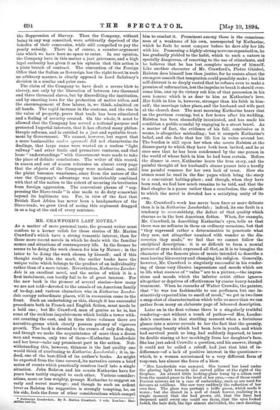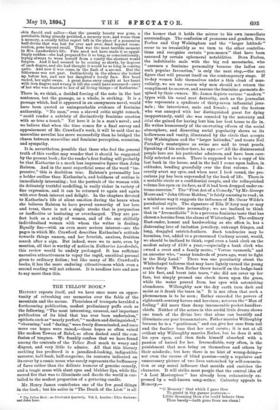MR. CRAWFORD'S LAST NOVEL.* As a matter of mere personal
taste, the present writer must confess to a keener relish for those stories of Mr. Marion Crawford's which have a strong romantic interest, than for those more recent novels in which he deals with the familiar scenes and situations of contemporary life. In the former he seems to be doing the work chosen for him by Nature ; in the latter to be doing the work chosen by himself; and if this thought really hits the mark, the earlier books have the unique value which belongs to the product of an individuality rather than of a mere talent. Nevertheless, Katharine Lauder- dale is an excellent novel, and the series of which it is a first instalment, can hardly fail to be of great interest. For the new book is the pioneer of several stories—how many we are not told—devoted to the annals of an American family of to-day, and various characters who in Katharine Lauder- dale occupy subordinate places, will in succession come to the front. Such an undertaking as this, though it has successful precedents both in French and English fiction, must needs be a bold one ; but Mr. Crawford, man of genius as he is, has some of the reckless impulsiveness which builds a tower with- out counting the cost, and in these three volumes there are narrative-germs which clearly possess potency of vigorous growth. The book is devoted to the events of only five days, and though we make the acquaintance of more than a dozen men and women, only two of them—Katharine Lauderdale and her lover—take any prominent part in the action. Not- withstanding this, however, thinness is the last quality one would think of attributing to Katharine Lauderdale ; it is, in- deed, one of the best-filled of its author's books. As might be expected from the time covered, its narrative covers a brief series of events which practically resolves itself into a single situation. John Ralston and his cousin Katharine have for years been tacitly engaged to each other. Various consider- ations, more or less weighty, prompt Katharine to suggest an early and secret marriage; and though to such an ardent lover as Ralston the suggestion is strongly tempting, he, on his side, feels the force of other considerations which compel
• Katharine Lauderdale. By F. Marion Crawford. 3 vols. London: Mao- "Man and Co.
him to combat it. Prominent among these is the conscious- ness of a weakness of his own, unsuspected by Katharine, which he feels he must conquer before he dare ally her life with his. Possessing a highly-strung nervous organisation, he has gradually yielded to the habit, which to such a nature is specially dangerous, of resorting to the use of stimulants, and he believes that he has lost complete mastery of himself.
Like another character of Mr. Crawford's, Pietro Ghisleri, Ralston does himself less than justice, for he resists about the strongest assault that temptation could possibly make ; but his self-distrust is so deeply rooted that he refuses even to make a promise of reformation, lest the impulse to break it should over- come him, and ey its victory rob him of that possession in his own honour which is as dear to him as Katharine's love. Her faith in him is, however, stronger than his faith in him- self ; the marriage takes place, and the husband and wife part at the church door. The next morning Katharine hears that on the previous evening, but a few hours after his wedding, Ralston has been shamefully intoxicated, and has made his condition a public scandal by engaging in a street brawl. As- a matter of fact, the evidence of his fall, conclusive as it seems, is altogether misleading ; but it compels Katharine's belief, and she feels that her life lies in ruins around her.
The burden is still upon her when she meets Ralston at the dinner-party to which they have both been invited, and he at once sees that he has been condemned by the one person in the world of whose faith in him he had been certain. Before the dinner is over, Katharine hears the true story, and the painful thought of her husband's shame passes into a hardly less painful remorse for her own lack of trust. How she atones must be read in the fine pages which bring the story to a convenient halting-place ; and though, when they have been read, we feel how much remains to be told, and that the final chapter is a pause rather than a conclusion, the episode to which the novel is devoted has a satisfying unity of its own.
Mr. Crawford's work has never been finer or more delicate than it is in Katharine Lauderdale ; indeed, its one fault is a tendency to over-subtlety, the defect of that quality which charms us in the best American fiction. When, for example, Mr. Crawford, in describing Katharine's eyes, tells us that there was no softness in them on ordinary occasions, but that "they expressed rather a determination to penetrate what they saw, not altogether unmixed with wonder at the dis- coveries they made," we feel that we cannot follow the analytical description: it is as difficult to form a mental picture of eyes which expressed all that, as it is to imagine the character of the famous piece of music intended to describe a man leaving his country and changing his religion. Generally, however, Mr. Crawford is singularly successful in his render- ing of those very illusive impressions and moods which are to life what nuances of "value" are to a picture,—the impres- sions and moods which the inferior artist either ignores altogether or deprives of effectiveness by coarse heavy-handed treatment. When he remarks of Walter Crowdie, the painter, that "he was too fashionable to use perfumes, but one in- stinctively expected him to smell of musk," we get in two lines a snap-shot of characterisation which tells us more than we can gather from many an elaborate page of laboured description.
Later on in the first volume there is a singularly truthful rendering—not without a touch of pathos—of Mrs. Lauder- dale's emotions in that startling moment when a fortuitous glance into a mirror reveals to her the fact that the queenly, conquering beauty which had been hers in youth, and which had survived youth so long, had suddenly departed, to leave its double staring at her mockingly from her daughter's face. She has just asked Crowdie a question, and his answer, though it could not be called a rebuff, had just that hint of in- difference—of a lack of positive interest in the questioner— which, to a woman accustomed to a very different form qf response, has almost the force of a blow.
"Mrs. Lauderdale was annoyed. She turned her head under the glaring light towards the carved pillar at the right of the fireplace. An absurd little looking-glass hung by a. silken cord from the mantel-piece to the level of her eyes,—one of those small Persian mirrors set in a case of embroidery, such as are used for favours at cotillons. She saw very suddenly the reflection of her own face. The glass was perhaps a trifle green, which made it worse ; but she stared in a sort of dumb horror, realising in a single moment that she had grown old, that the lines had deepened until every one could see them, that the eyes looked faded, the hair dull, the lips almost shrivelled, the once dazzling 'skin flaccid and sallow—that the queenly beauty was gone, a perishable thing already perished, a memory now, and worse than a memory, a cruelly bitter regret left in the place of a possession half-divine that was lost for ever and ever, dead beyond resur- rection, gone beyond recall. That was the most terrible moment in Mrs. Lauderdale's life. Fate need not have made it so appal- lingly sudden—she had prepared for it so long, so conscientiously, -trying always to wean herself from a vanity the sternest would forgive. And it had seemed to be coming so slowly, by degrees -of each degree, and she had thought it would be so long in coming quite. And now it was come, in the flash of a second. But the bitterness was not past. Instinctively in the silence she looked up before her, and saw her daughter's lovely face. Her head reeled, her sight swam. A great fierce envy caught at her heart with iron fingers and wrung it till she could have screamed—envy of her who was dearest to her of all living things—of Katharine."
There is, we think, a decided forcing of the note in the last sentences, but the passage, as a whole, is striking. It is a passage which, had it appeared in an anonymous novel, would have been quoted as unimpeachable evidence of feminine authorship. "No man," even a shrewd critic might remark, could render a subtlety of distinctively feminine emotion with so true a touch." Yet here it is in a man's novel ; and we believe that when the time comes for a final survey and appraisement of Mr. Crawford's work, it will be said that no masculine novelist has more successfully than he bridged the chasm between masculine and feminine perception, sensation, and sympathy.
It is, nevertheless, possible that those who feel the general truth of this verdict may wonder that it should be suggested by the present book; for the reader's first feeling will probably be that Katharine is a much lees impressive figure than John Ralston. And in the most superficial sense of the word "im- pressive," this is doubtless true. Ralston's personality has a bolder outline than Katharine's, and boldness of outline is immediately interesting ; but the portrait of the woman with its delicately truthful modelling, is really richer in variety of fine expression, and it can be returned to again and again with ever fresh interest and delight. In the chapters devoted to Katharine's life of silent emotion during the hours when she believes Ralston to have proved unworthy of her love and trust, there is not a single stroke that is purposeless .or ineffective or hesitating or overcharged. They are per- fect both as a study of woman, and of the one skilfully individualised woman with whom the writer is dealing. Equally fine—with an even more serious interest—are the pages in which Mr. Crawford describes Katharine's attitude towards things unseen, and her feverish, anxious, fruitless search after a sign. But indeed, were we to note, even by mention, all that is worthy of notice in Katharine Lauderdale, this review would be unduly prolonged. It has sufficient narrative attractiveness to repay the rapid, uncritical perusal given to ordinary fiction; but like many of Mr. Crawford's books, it has the more enduring attractiveness which even a second reading will not exhaust. It is needless here and now to say more than this.







































 Previous page
Previous page